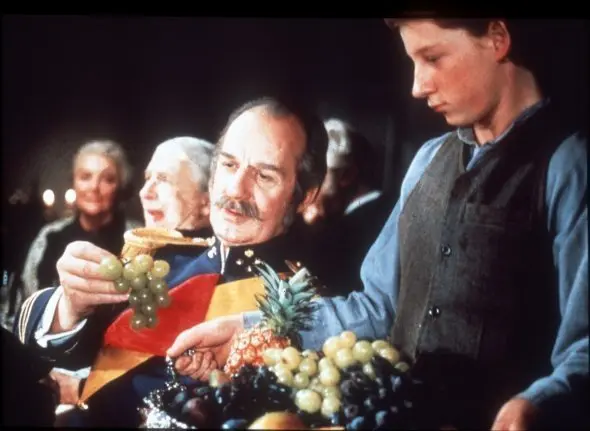With the good burghers of the UK reeling from revelations that there’s more horse in their impossibly cheap frozen dinners and meat patties than in the 2.30 from Uttoxeter, I started thinking about food in films. Not the “food as scene setter” – though who doesn’t hanker after a cosy neighbourhood Italian restaurant with booths and checky tablecloths, the sort you see in old Scorsese movies – no, I’m after the ones where food is either pivotal, or transgressive, or transformational. Significant, in other words.
Babette’s Feast (1987, dir: Gabriel Axel)
Often held up as the best film about food – I’d go along with that – Babette’s Feast dangles sensual pleasure in front of our noses for almost its entire duration, then finally gives us what we’ve been waiting for. The food is like a big payoff romantic moment. Based on a Karen Blixen novel (as was Out of Africa) it tells of an emigre Frenchwoman holed up in some puritanical Danish nowhere who suddenly discovers she’s had a big lottery win. To celebrate, she decides to cook a banquet, as only a Frenchwoman could, and invite all the locals. The only problem being that the locals don’t hold with fancy eating of any sort. Lobster… truffles… alcohol! The joy of this film is watching austere 19th century protestants yield to innocent, life-affirming and, yes, god-honouring pleasure. Fabulous, though best not watched on an empty stomach.
Eating Raoul (1982, dir: Paul Bartel)
A cult item in the early 1980s – it ran and ran in the small tatty cinemas that still existed then. It’s a story about everyday folk luring swingers to their home, then killing and robbing them, before being left with a waste disposal problem. It’s not so much the plot that pulled in the crowds but the way in which director Paul Bartel tells the story. Deadpan black comedy. You see a lot of that about these days, but you didn’t back then.
Soylent Green (1973, dir: Richard Fleischer)
One of a small handful of interesting sci-fi films that Charlton Heston – too old for the chariot – made at the time (Planet of the Apes and The Omega Man also spring to mind), Soylent Green was the last film of a sick looking Edward G Robinson and an early arrival in the genre now known as dystopian sci-fi, which regularly features big government and big business in an unholy war against the little guy. I doubt that many people used the word “dystopian” too often back then. In the upcoming Cloud Atlas one of Jim Broadbent’s many characters shouts in a moment of madness – “Soylent Green is people,” Chuck’s big line at the end of the film. Sorry for the spoiler if you haven’t seen it.
The Turin Horse (2011, dir: Béla Tarr)
The great Hungarian auteur best known for his epic Werckmeister Harmonies claims that this is his last film. And what a way to go. As if he were saying “you want arthouse, I’ll give you arthouse”, Tarr starts out with a little preamble about the philosopher Friedrich Nietzsche’s final sane act – he threw his arms around the neck of a horse that was being beaten to protect it. After that he took to his bed, never spoke again, went entirely mad and died. Then, in a muted monochrome (as if shot by Bergman’s cinematographer Sven Nykvist), Tarr introduces us to what looks like the entirely unrelated, unchangingly miserable, almost entirely wordless lives of an old farmer and his young daughter. The highlight of each day being when they eat dinner – a single large potato which they fall on as if they’ve never seen food before, while the gale moans, the soundtrack clanks and an off-screen extra throws yet another bucket of dried leaves into the wind machine. Bleak doesn’t begin to describe it. Yet it is intensely gripping. What is the crotchety Hungarian doing? I reckon he’s having a big arthouse laugh.
4 Months, 3 Weeks, 2 Days (2007, dir: Cristian Mungiu)
One of the best directors working in Europe right now, and a key player in the Romanian New Wave of the noughties, Mungiu has not bettered this incredibly dark film about a girl going to get an illegal abortion in the grim old days of the Ceausescu regime. Piling misery on misery, indignity on indignity – at one point the abortionist decides he needs extra payment, sex with both the pregnant girl and her accompanying friend – the film’s payoff shot, right after we’ve seen a newly born, newly dead baby lying on a bathroom floor, is the plate of food brought to the girl in the restaurant of the hotel where she’s had the procedure. It’s offal, breaded brains, cold cuts and the grimly reminiscent like. Cue end titles and Mungiu’s ta daaa – a card comes up with the words “From the series Tales from the Golden Age“. Comedies don’t come much darker than that.
4 Months, 3 Weeks, 2 Days – at Amazon
PS I didn’t mention Sweeney Todd because I can’t stand the melody-dodging music of Sondheim, much as I love his lyrics, and Johnny Depp is many things but a singer isn’t one of them.
PPS Also didn’t mention Jiro Dreams of Sushi, the great documentary about the sushi master with a tiny resto in the basement of a Tokyo office building. And also forgot Our Daily Bread (2005) another documentary, this time an astonishing one about the increasingly mechanised production of food.
I am an Amazon affiliate
© Steve Morrissey 2013
